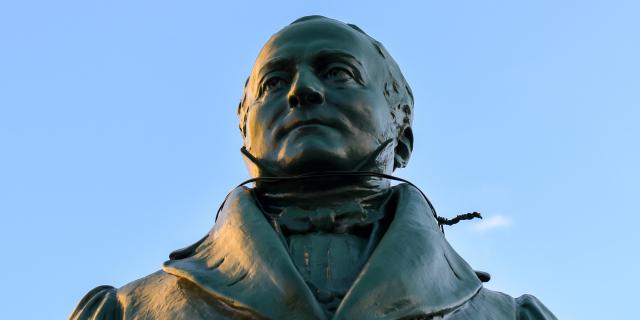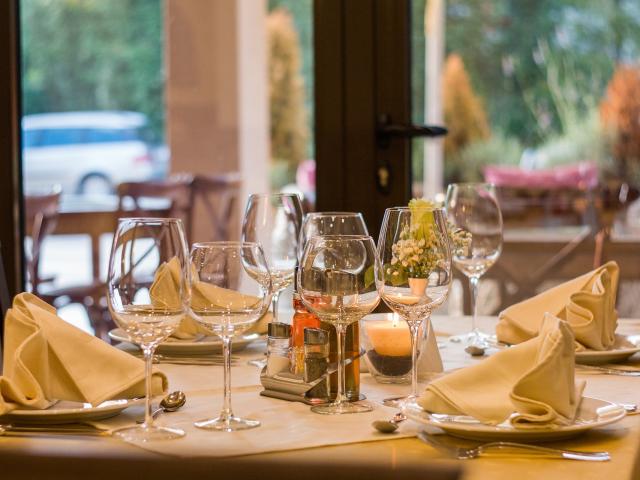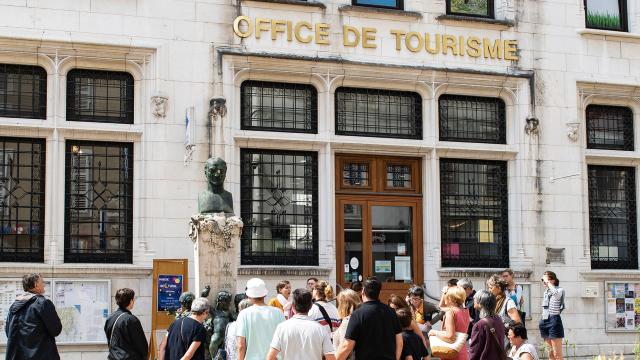The magistrate and the politician
Jean Anthelme BRILLAT-SAVARIN was born in Belley on April 2nd 1755 in the family house located today at No. 62 Grande Rue.
From a family of jurists (his father, Anthelme, was a King’s prosecutor in Belley, one of his brothers was a magistrate), he studied at the town’s college, then joined the faculty of law in Dijon.
Thereafter, he became a lawyer at the bar of Belley.
Elected deputy of the Third Estate to the Estates General in 1789, he sat in the Constituent Assembly.
Contrary to a widespread belief, he was in favor of the death penalty, which, according to him, had a dissuasive effect.
He was in turn President of the Civil Court of the Ain, then judge of cassation.
His exile in the United States
In the post revolution context of terror, he appeared as a moderate, and was deposed on August 10, 1792.
He was elected Mayor of Belley in 1793 in spite of everything.
Denounced by the Montagnard party, he was accused of federalism, of being the author of disturbances in “Belley regenerated”, and of having conspired against the Revolution.
Summoned before the Revolutionary Tribunal, he fled to Switzerland, then passed to the Netherlands, accompanied by Baron Jean-Antoine de Rostaing, commissioner of the Army of the Alps.
In June 1794, in Rotterdam, they embarked on board the “Friendship” and took 24 days to reach New York.
In New York, Brillat-Savarin became 1st violinist at the city’s theater and gave French lessons.
He returned to France in 1797.
 Visite guidée du centre historique de Belley par l'Office de Tourisme
Visite guidée du centre historique de Belley par l'Office de TourismeHis return to France
He was then appointed secretary of the General Staff of Augereau’s Army Corps, in Germany, and then government commissioner at the court of Versailles.
After the 18 brumaire, he entered as a counselor at the court of cassation.
Already ill, he attended the anniversary ceremony of the death of Louis XVI on January 21, 1826. He died a few days later of pleurisy, on February 2, 1826, at the age of 71.
He is buried in the Père Lachaise cemetery.
The writer
Brillat-Savarin’s tastes were very eclectic, even though he is mainly known for his work on gastronomy, the Physiology of Taste.
He was fond of music as well as hunting, philosophy and astronomy.
He wrote several works: in 1819 a “Historical and critical essay on the duel, and a Memoir on the archaeology of the eastern part of the department of Ain (Bugey).”

The Gastronome
The Physiology of Taste is a code of gastronomy, a treatise on culinary science.
According to Balzac, “no author had known how to give to the French phrase such a vigorous relief “since the 16th century.
His book was put on sale on February 1826. Brillat-Savarin could not attend its success.
The copyrights were sold by his heirs to pay the inheritance tax.
Quotes and aphorisms of Brillat-Savarin :
“A dessert without cheese is a beauty missing an eye”
“Tell me what you eat, I’ll tell you who you are”
“Gluttony is the enemy of excess”
“Those who indulge or get drunk, don’t know how to drink or eat”
“What is health? It is chocolate”
“The table is the only place where one is never bored during the first hour”
“To invite someone is to take care of his happiness during the whole time he is under your roof”
It is to Brillat-Savarin that we owe the popularization of the word conviviality.

Brillat-Savarin's birthplace in Belley
n°62 Grande Rue
In contrast to the other buildings of Brillat-Savarin’s birthplace, the facade dates from the reconstruction of the Grande Rue (15th century) with the grooved arcades, the bracketed doors of the entrance corridor and the stair tower.
The lintel of the 2 doors at the end of the corridor is characteristic of the 17th century.
The arcades on the courtyard represent the transition between the 16th and 17th centuries.
The interest of this house remains in its variety of architecture. The courtyard of this house is part of the tour of the historic heart of Belley.











